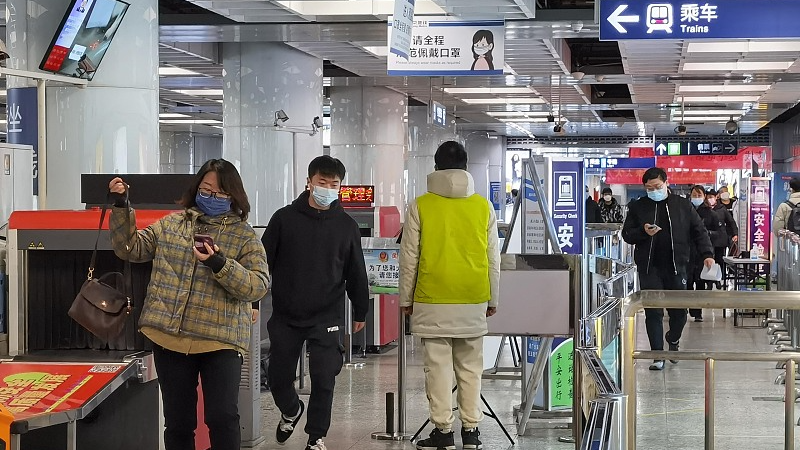
People wearing masks take metro in Nanjing, Jiangsu Province, China, December 5, 2022. /VCG
People wearing masks take metro in Nanjing, Jiangsu Province, China, December 5, 2022. /VCG
Editor's note: Charles Ng is a medical doctor who holds a Master of Public Health from Johns Hopkins University. As the founding president of the Digital Health Society, he led the COVideo19 initiative and published the Digital Solutions for Covid-19 Response for the Bill & Melinda Gates Foundation. The article reflects the author's opinions, and not necessarily the views of CGTN.
Starting January 8, 2023, the Chinese government steps down its pandemic policies in the best interest of citizens.
For some time, the central health authorities categorized infectious diseases into three classes according to the lethality, transmissibility and curability of the inciting pathogen. Diseases requiring "Class A management" such as cholera warrant the most robust pandemic policies lest they tear into China and potentially kill millions of people. In recent epidemiological history in China, severe acute respiratory syndrome (SARS) and influenza H1N1 had required Class A policies at the outset. And both diseases were subsequently managed by Class B policies. Such is the meticulousness of the central government.
With 1.4 billion lives at stake, governing with the mantra of "better safe than sorry" is not only reasonable, but essential. At times of crisis, all that matters strips down to survival – the right to live – the most fundamental human right without which other rights no longer become relevant. Hence, newly emerged diseases that are highly transmissible are not taken lightly by the state until evidence suggests it is safe. What constitutes safety is quite universal and not difficult to understand: Lethality must be low.
Annual influenza is deemed endemic and managed as "Class B" for that reason. Despite high transmissibility, influenza virus is prevalent mostly among young, healthy adults who preamble and toil. And it kills fewer elderly people and children than the original strain of COVID-19 did. Getting the vulnerable population vaccinated against influenza prior to the seasonal spike each year helps.
Three years into the COVID-19 pandemic, much has changed. It has evolved numerous times to become omicron, the strain that has been predominant among all infections for a while. What has been known to laymen as mutations after omicron, such as BA.4, BA.5 and XBB1.5, are classified by experts as submutations.
Viruses are known to adopt parasitical behaviors. It cannot survive without a host. That is why HIV, a virus that weakens but not takes out the host, has been considered the most successful virus by epidemiologists. SARS-CoV2 is no exception. Studies suggest that the death rate of omicron is lower than the original strain. Fewer people suffer from severe complications that require hospitalization.
Moreover, an increasing proportion of citizens across the country are getting jabbed. China has a homegrown mRNA vaccine in the pipeline. Blanket vaccination of healthy adults in cities has been progressing well. Reaching into the hinterlands to immunize the weaker elderly may prove more challenging, though past experience suggests that the central government will take great pains to achieve what is best for the people.
Propping up immunity in the population is essential. Less severe do symptoms become when infected. That means fewer patients require intubation and shorter queues at the emergency rooms. Hence, the health system is protected from overloading – a case seen in Britain and Italy where severe shortages of medical equipment and healthcare workers left many patients dead during the first wave of COVID-19 pandemic. It appears unlikely China will make the same mistake.
And not just that, Tsinghua University developed an antibody drug that was approved by the regulators a month ago. A few other drugs, including Paxlovid, an antiviral drug developed by Pfizer, have recently been approved as treatments for COVID-19. Specifically, most drugs weaken the virus to prevent severe complications or even death.

An employee packs medicines at a pharmaceutical company in Xi'an, northwest China's Shaanxi Province, January 4, 2023. /Xinhua
An employee packs medicines at a pharmaceutical company in Xi'an, northwest China's Shaanxi Province, January 4, 2023. /Xinhua
Armed with more defensive tools against a pathogen that turned less virulent, it presents a perfect opening for China to take one big step toward normalcy. Rewind one year, many countries normalized hastily before statistics became available to guide policy changes then suffered from a spike in excess mortality. Those countries then described China's pandemic policies as draconian, inhumane and unsustainable.
Despite the World Health Organization (WHO) officially stating that COVID-19 pandemic was far from over because of low vaccine rates and high mortality of the delta variant, they continued to exert immense pressure on China to reopen its borders for fear that a global supply chain severed too long may be difficult to revive. No longer could products made in China be shipped abroad. And imports proved equally hard to get into the mainland. All that is about to change.
China is emerging relatively unscathed from the pandemic. Ironically, as Chinese mainland reopens, western countries baselessly claim that China risks exporting unknown variants to the world. In fact, XBB1.5, the latest predominant strain, was found to originate in America. Equipped with enhanced immunity evasion proteins, this slippery subvariant has been wreaking havoc in the U.S. and the UK in the last few weeks. And no other country has stood up against the culprit – the true exporter of evasive variants.
The central government had known that pandemic policies would not be in place forever. But people's lives deserve to be respected. Over the last few years, the central government has bought plentiful time for the people to defend against COVID-19. As it stands, a population with much improved resilience seems likely to withstand further viral onslaughts.
As China reconnects with the world, it is counterintuitive for major economies to erect restrictions. The pre-COVID diplomatic turbulences may have faded out for some time. More grudge against China upsets global peace and prosperity. The post-COVID era presents an opportunity for nationalists to put an end to what might be self-defeating – only when more countries come together to bring about the benefits of globalization.
(If you want to contribute and have specific expertise, please contact us at opinions@cgtn.com. Follow @thouse_opinions on Twitter to discover the latest commentaries in the CGTN Opinion Section.)